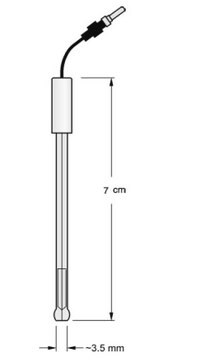If this product has an expiration or retest date, it will be shown on the Certificate of Analysis (COA, CofA). If there is no retest or expiration date listed on the product's COA, we do not have suitable stability data to determine a shelf life. For these products, the only date on the COA will be the release date; a retest, expiration, or use-by-date will not be displayed.
For all products, we recommend handling per defined conditions as printed in our product literature and website product descriptions. We recommend that products should be routinely inspected by customers to ensure they perform as expected.
For products without retest or expiration dates, our standard warranty of 1 year from the date of shipment is applicable.
For more information, please refer to the Product Dating Information document: https://www.sigmaaldrich.com/deepweb/assets/sigmaaldrich/marketing/global/documents/449/386/product-dating-information-mk.pdf
Kluczowe dokumenty
719803
Carbon nanofibers
graphitized, platelets(conical), >98% carbon basis, D × L 100 nm × 20-200 μm
Synonim(y):
PR-25-XT-LHT, Conical carbon nanofibers
Wybierz wielkość
705,00 zł
Wybierz wielkość
About This Item
705,00 zł
Polecane produkty
pochodzenie biologiczne
platelets (conical)
Poziom jakości
Próba
>98% carbon basis
Formularz
powder
charakterystyka ekologicznej alternatywy
Design for Energy Efficiency
Learn more about the Principles of Green Chemistry.
sustainability
Greener Alternative Product
śr. × dł.
100 nm × 20-200 μm
powierzchnia
39 m2/g
zanieczyszczenia
<14,000 ppm Iron content
średnia średnica
130 nm
wielkość porów
0.12 cm3/g average pore volume
126.1 Å average pore diameter
mp
3652-3697 °C
gęstość
1.9 g/mL at 25 °C
gęstość nasypowa
0.5‑3.5 lb/cu.ft
kategoria ekologicznej alternatywy
, Enabling
ciąg SMILES
[C]
InChI
1S/C
Klucz InChI
OKTJSMMVPCPJKN-UHFFFAOYSA-N
Szukasz podobnych produktów? Odwiedź Przewodnik dotyczący porównywania produktów
Powiązane kategorie
1 of 4
Ta pozycja | 719811 | 900711 | 685380 |
|---|---|---|---|
| assay >98% carbon basis | assay >98% carbon basis | assay ≥98% carbon basis, <1% (ash) | assay >90% carbon basis |
| Quality Level 200 | Quality Level 200 | Quality Level 100 | Quality Level 100 |
| biological source platelets (conical) | biological source platelets (conical) | biological source - | biological source - |
| greener alternative product characteristics Design for Energy Efficiency | greener alternative product characteristics Design for Energy Efficiency | greener alternative product characteristics - | greener alternative product characteristics - |
| sustainability Greener Alternative Product | sustainability Greener Alternative Product | sustainability - | sustainability - |
Opis ogólny
Zastosowanie
Uwaga dotycząca przygotowania
Informacje prawne
Hasło ostrzegawcze
Warning
Zwroty wskazujące rodzaj zagrożenia
Zwroty wskazujące środki ostrożności
Klasyfikacja zagrożeń
Eye Irrit. 2 - STOT SE 3
Organy docelowe
Respiratory system
Kod klasy składowania
11 - Combustible Solids
Klasa zagrożenia wodnego (WGK)
WGK 3
Temperatura zapłonu (°F)
Not applicable
Temperatura zapłonu (°C)
Not applicable
Wybierz jedną z najnowszych wersji:
Masz już ten produkt?
Dokumenty związane z niedawno zakupionymi produktami zostały zamieszczone w Bibliotece dokumentów.
Produkty
Nanowłókna węglowe Pyrograf®-III wytwarzane metodą parową należą do klasy materiałów określanych jako wielościenne nanorurki węglowe (MWCNT) i są produkowane metodą pływającego katalizatora.
Pyrograf®-III vapor-grown carbon nanofibers are within the class of materials termed multi-walled carbon nanotubes (MWCNTs), and are produced by the floating catalyst method.
Composite materials with micron scale reinforcements offer tailored properties for various applications.
3D printing is a type of additive manufacturing that can be used to rapidly fabricate components with highly customizable geometries.
-
How can I determine the shelf life / expiration / retest date of this product?
1 answer-
Helpful?
-
-
How is shipping temperature determined? And how is it related to the product storage temperature?
1 answer-
Products may be shipped at a different temperature than the recommended long-term storage temperature. If the product quality is sensitive to short-term exposure to conditions other than the recommended long-term storage, it will be shipped on wet or dry-ice. If the product quality is NOT affected by short-term exposure to conditions other than the recommended long-term storage, it will be shipped at ambient temperature. As shipping routes are configured for minimum transit times, shipping at ambient temperature helps control shipping costs for our customers. For more information, please refer to the Storage and Transport Conditions document: https://www.sigmaaldrich.com/deepweb/assets/sigmaaldrich/marketing/global/documents/316/622/storage-transport-conditions-mk.pdf
Helpful?
-
Active Filters
Nasz zespół naukowców ma doświadczenie we wszystkich obszarach badań, w tym w naukach przyrodniczych, materiałoznawstwie, syntezie chemicznej, chromatografii, analityce i wielu innych dziedzinach.
Skontaktuj się z zespołem ds. pomocy technicznej








